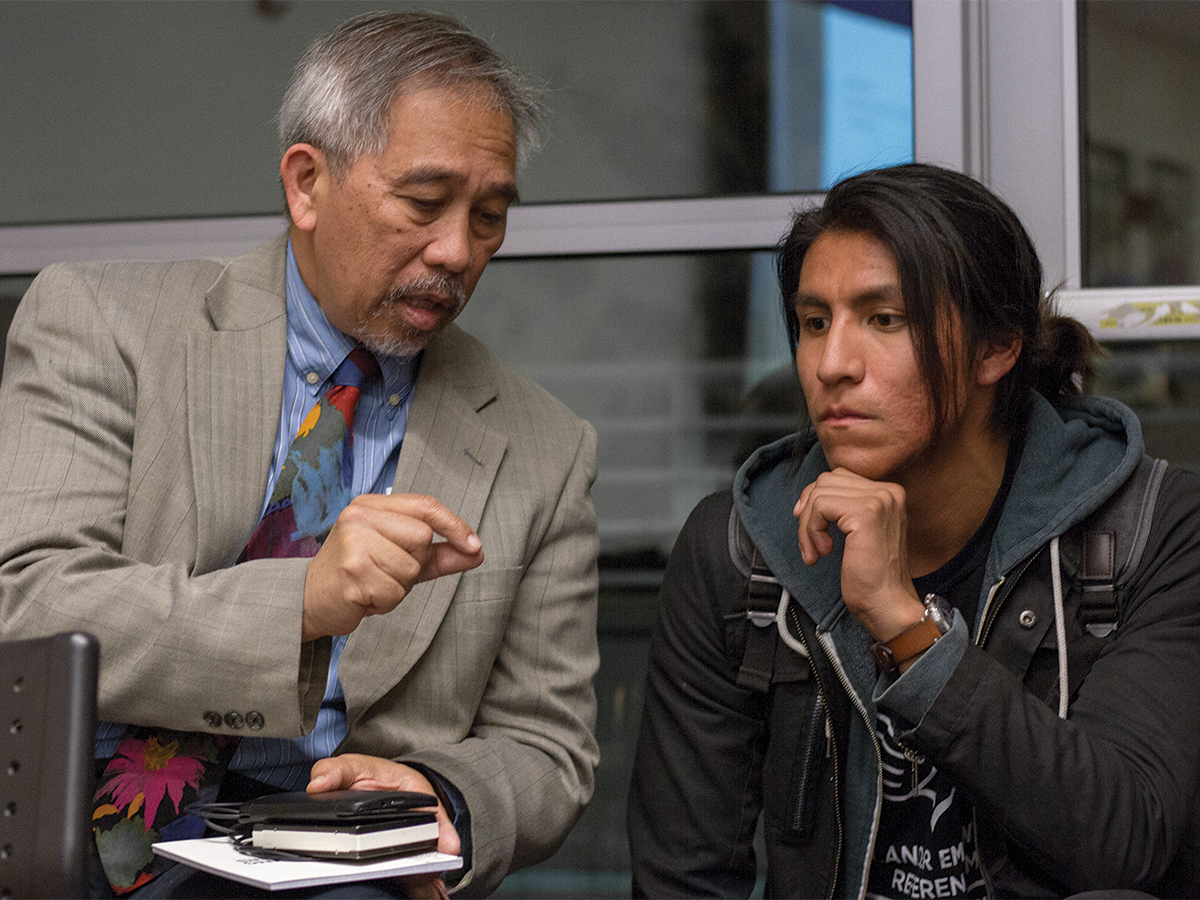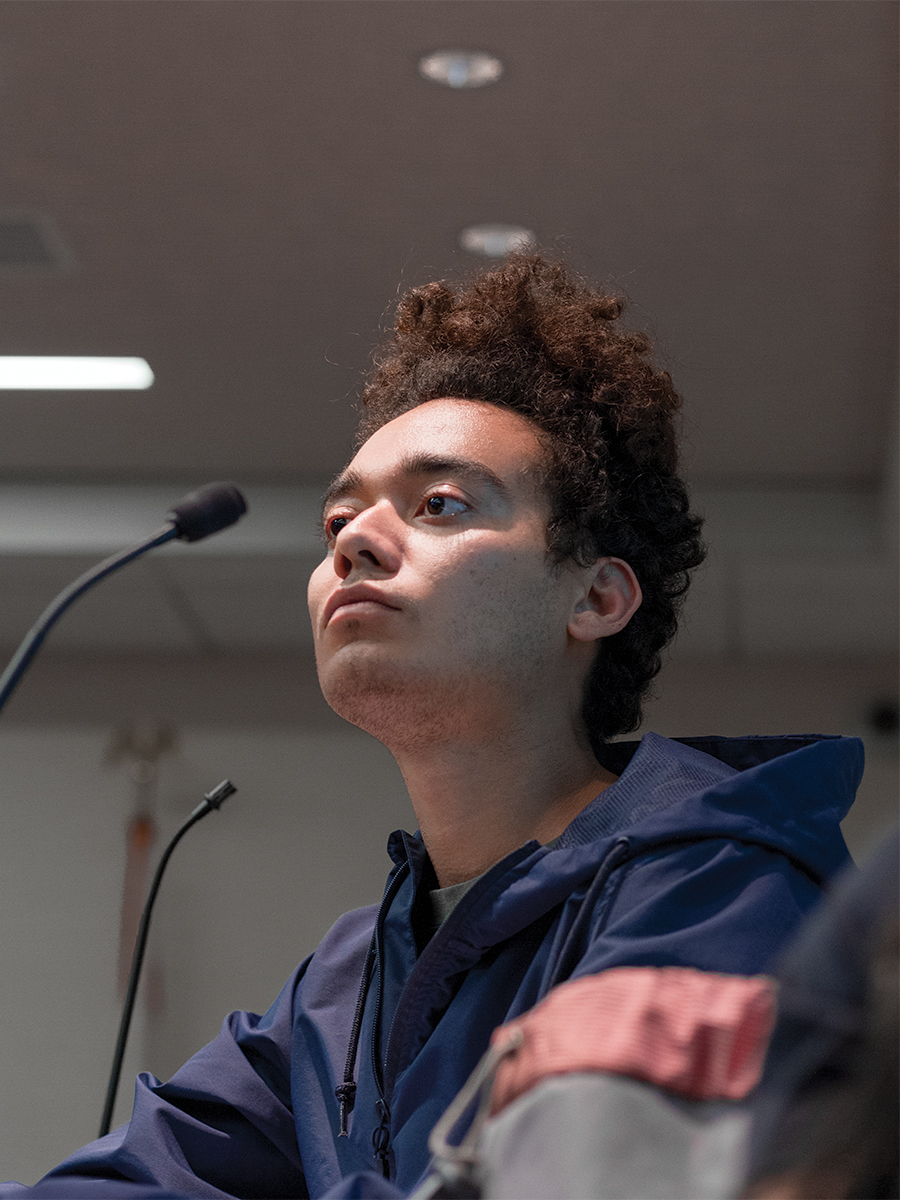Written by Mark Bertumen, CW with contributions by Aidan Rutten, CW and Amani Mahmoud, CW
The Highlander Empowerment Student Services Referendum (HESSR) failed to pass in this year’s elections, and around 35 students and staff came to voice their concerns at the ASUCR senate meeting on Wednesday, May 2. Both the over-packed audience and ASUCR senators expressed their frustrations with the election, from the “voting bug” of the polling stations to the misreportings of referenda reaching the vote requirement. Only 14.39 percent of the student population voted when 20 percent turnout was needed. The HESSR garnered the most discussion time compared to proposed ASUCR bylaw changes; if passed, the referendum would have provided more funding to UCR’s ethnic and gender programs in Costo Hall starting in 2020.
The meeting began at 6:36 p.m., Chief Justice Jo Gbujama opened the discussion on elections, highlighting what he called “three big things” concerning the elections during ex-officio reports. He began his report by addressing the allegations of ballot tampering; a rumor spread on Friday, April 27 that votes in the ballot boxes were being removed, which resulted in the insufficient voter turnout. Gbujama asserted that this was not the case, citing an email that the judicial branch sent out before the meeting on Wednesday. “During elections week, at least three members of the (judicial) branch would help transport the ballots from polling stations to the office of Executive Director Laurie Sinclair,” said Gbujama. “There is video evidence recording that no ballots were mishandled.”
Gbujama also discussed laptopping, a currently outlawed method of soliciting votes that allowed candidates and their associates to pressure students to vote on personal electronic devices. Gbujama stated that he was against revisiting the method, remarking that they received no reports of voting violation against any of the candidates this year, in comparison to the 22 violation reports last year (16 of which were laptopping-related).
Gbujama concluded by stating that low turnout was due to a lack of outreach, pointing out that there was only one pro-referendum group on the campus for the entire election.
The senate then discussed how to improve voter turnout. Gbujama explained that the senators could only do what is outlined by their constitution, which omits guidelines for recalling referenda results. The constitution itself can only be altered by a referendum calling for an amendment.

The HESSR discussion began with Joaquin Malta, student assistant for the Native American Student Programs and chair of the Referendum Student Advisory Committee (RSAC). One goal of the RSAC is to look over the budgets for the ethnic and gender programs of UCR — the main programs affected by the HESSR. Malta called for ASUCR representatives to be held accountable for the alleged mistakes that they made during the election, including the spread of misinformation during elections that the referenda had passed when they had actually not. The false information was first spread to the directors of Costo Hall. He emphasized that it was not enough to only say sorry; “Apologies only get you so far,” said Malta.
Malta also pointed out the inconsistencies in how voting was performed, stating that some of the polling sites didn’t require you to bring your R’Card to vote while other sites required you to swipe the card. BCOE Senator Patrick Le responded that he and his team created the card swipers, and he took full responsibility for any problems that may have occurred. He specifically elaborated on the “voting bug,” where a new patch that was released for the swiper program ended up doubling the amount of votes that a student already made.
CHASS Senator Marco Ornelas responded that ASUCR would learn from these mistakes, but Malta was not satisfied with that answer. “To move forward, ASUCR will just learn from its mistakes and try again next year? That’s all you’re doing right now?” Malta inquired, to which Ornelas responded, “I’m not elections director.” Discussion between the two ended when Ornelas rebutted that “(The mistakes) are for next year’s election (because) I’m graduating.” The room was audibly astonished by the response, and order had to be called by Executive Vice President Carisha Moore, requesting that all parties be respectful to each other.
Elections Director Taylor Brown added her thoughts on the voting bug, empathizing with those frustrated by the failure to secure funding and wishing to improve upon the elections process and as a governing body in general. “We were all devastated when we came up short. We would like to know what we can do to fix it now, before most of us leave (for graduation),” Brown said. “I want what you want, and this is a difficult job to do.”
CHASS Senator Grant Nakaoka also sympathized with the grievances of the crowd. “This system was not designed to help students help other students,” Nakaoka explained. “You’re witnessing it right here; we can’t talk freely because of parliamentary procedure. It’s an institutional problem, and our hands are tied.” Malta concluded his allotted time by reiterating that ASUCR had nothing in their power to fix the issues at hand, not until next year.
Vice President of Internal Affairs and 2018-19 president-elect Semi Cole clarified why this is the case, stating that Chancellor Kim Wilcox put a “cap” on the HESSR when it was initially passed five years ago, meaning that the funding provided by the referendum would only be in effect for a period of five years. He also pointed out that caps are not common among other referenda. “Like people said earlier, this is an institutional problem because the chancellor himself is the one who put us in this position, where we have to vote every five years to continue funding.” CHASS Senator Mariam Alkhalili affirmed that because of this, ASUCR would be in “gridlock” when handling the issue until next year.

Martin Lopez/HIGHLANDER
Nakaoka responded that there’s not a quick or easy answer. “That’s the problem,” he said,
“I don’t have the answers. I wish I did, otherwise we wouldn’t be in this situation. I think it takes a community group effort to figure this out.” In the vein of community effort, Cole then suggested that UCR work with the other UCs to handle this sort of issue.
Moore said that, to ensure that referenda like the HESSR get passed in the future, she intends to advocate for lowering the percentage of students needed for passage from 20 percent to 15. Concerning improvement on relationships, Alkhalili said she tried to reach out to student organizations in the past, but was met with a lack of willingness from the receiving parties to work together.
Alkhalili intended to fix these relationships with a bylaw last year that required representatives to meet together more often. “Since I started office, I was aware of the shaky relationship between ASUCR and Costo Hall, so in the fall quarter I passed a bylaw ensuring that every single (ASUCR) senator was meeting with at least two Costo Hall senators,” she said.
Later in the meeting, Assistant Dean of Students Joe Virata was called on to speak by the audience. Virata emphasized the need for greater communication between students and administration. “If this (ASUCR) body and this (student) body wants to have answers to the questions that are being raised, I’ll open the door,” Virata declared, “because I think it’s important that our administrators are accessible, that there be a willing ear on the other side.”
Virata further spoke about why the referendum did not pass, stating that more work needs to be done in the future to ensure that the campus is mobilized to vote. Soon after, an audience member went up asking when Virata could let that work be done, starting next week. Virata responded that anyone wanting to do so could meet him in his office (HUB 381) on Tuesday, May 8 at 4 p.m.
Discussion of the HESSR continued until 8:35 p.m., when the time allotted for the discussion ran out. Moore urged everyone to continue working with both themselves and ASUCR to improve the system and make sure that all referenda are passed next year. After the discussion period officially ended, a majority of the audience left the room.
The senate continued their meeting, passing bylaw amendments and announcing their senator reports before adjourning the meeting at 9:24 p.m., after nearly three hours of meeting.
Highlights:
- CHASS Senator Solomon Demeku proposed the passage of his Athletic Awareness Committee bylaws. The Athletic Awareness Committee is intended to get students more involved in UCR athletic events and increase student engagement with UCR athletes. The committee will be under the office of the ASUCR president and members will be appointed by the personnel director.
The next ASUCR senate meeting will be held Wednesday, May 9 at 6:30 p.m. in the ASUCR Senate Chambers, HUB 221.








